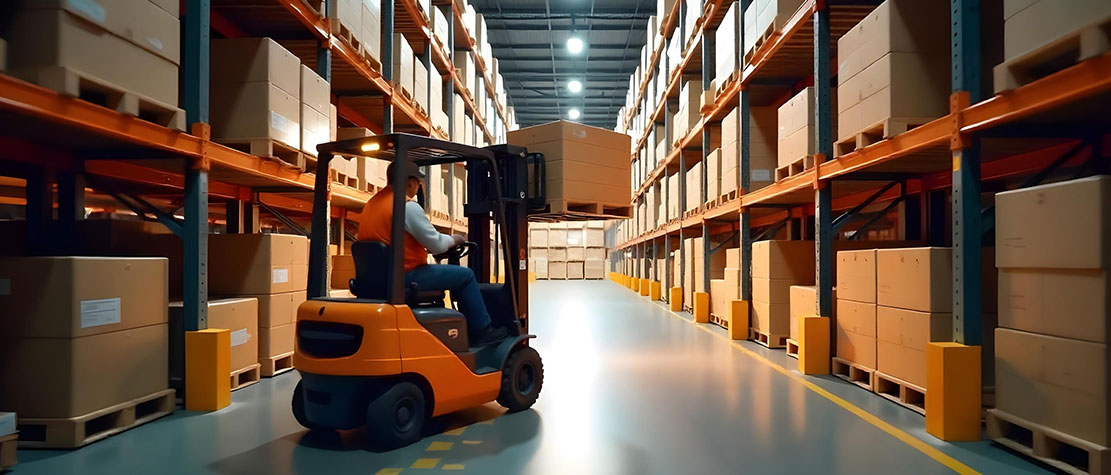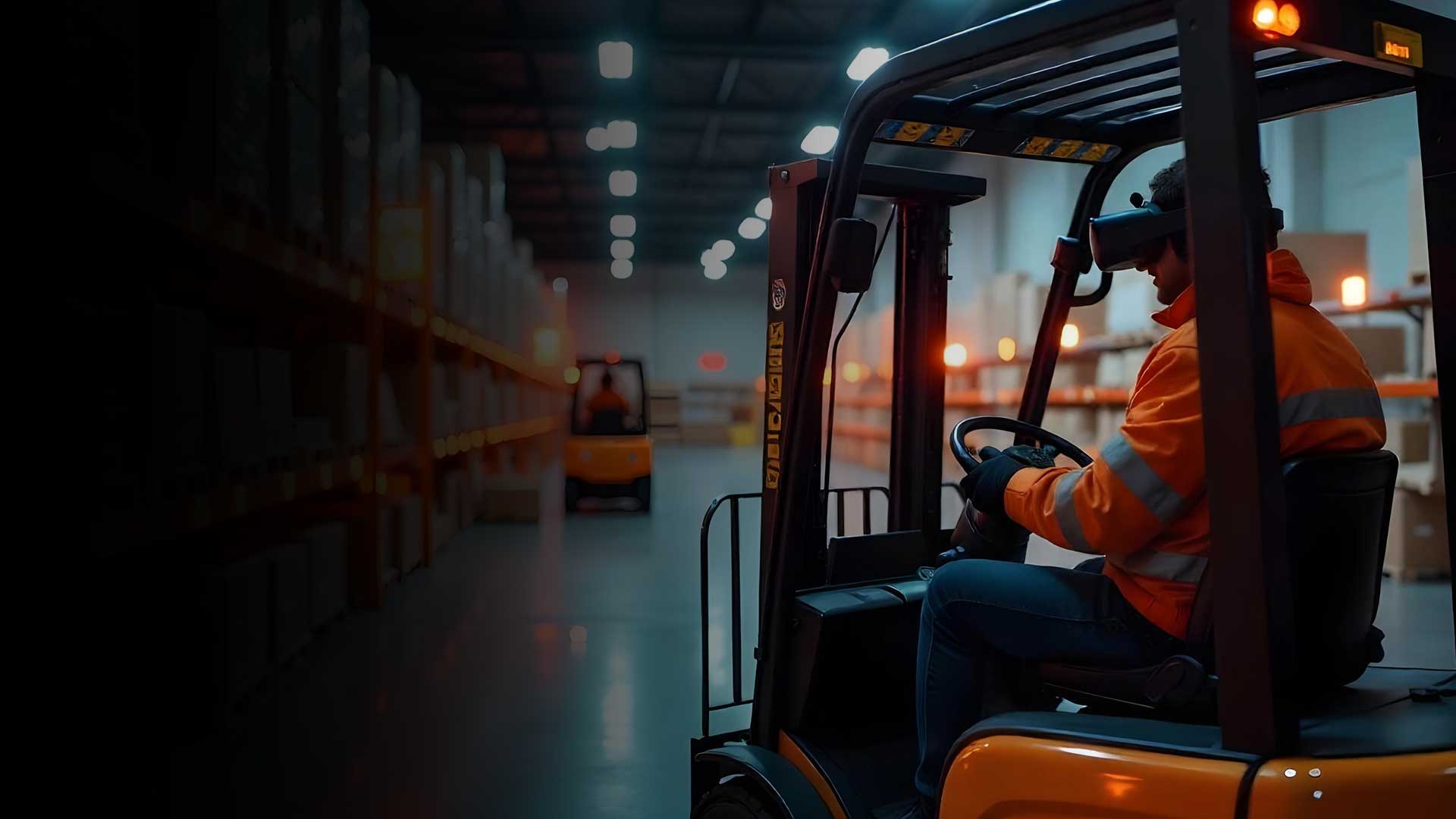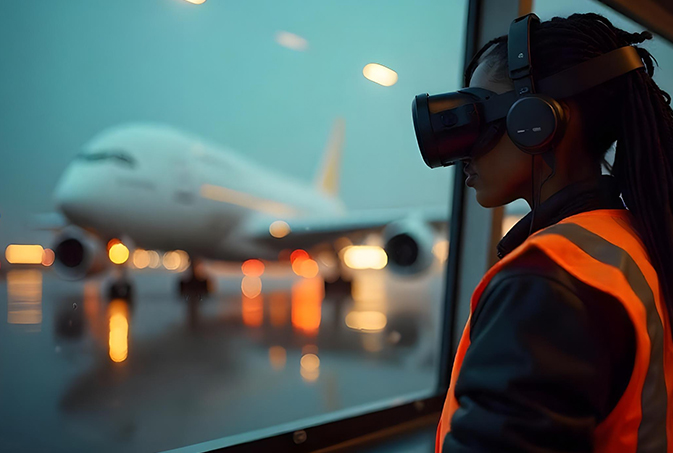Virtual reality is transforming industrial training, and forklift operations are no exception. VR forklift training offers a safer, immersive, and highly effective way to upskill operators. This guide explores how upgrading forklift training with virtual reality improves safety, enhances learning retention, and prepares your workforce for real-world warehouse challenges.
Summary
- Conventional forklift training often involves classroom lessons, manuals, and live practice sessions, which limit engagement and make it difficult to simulate real-time warehouse challenges and emergencies safely.
- Virtual Reality forklift training offers an immersive, interactive environment where operators can safely practice navigation, load handling, and hazard response through realistic and repeatable simulations.
- VR forklift training boosts safety, enhances knowledge retention, provides standardized learning, and builds operator confidence through hands-on virtual practice without the risks of real-world mistakes.
- A robust VR forklift simulator should include real-time feedback, lifelike warehouse layouts, customizable scenarios, and accurate forklift physics for comprehensive, skill-focused learning.
- While VR forklift training requires upfront investment, it reduces long-term costs associated with equipment damage, accidents, and extended onboarding, offering a scalable, future-ready training solution.
- As VR technology advances, organizations can expect more adaptive and intelligent training tools that elevate workforce readiness, safety, and operational efficiency across warehousing and logistics.
Evolution of Forklift Training Methods
Forklift training has evolved significantly, transitioning from basic demonstrations to immersive virtual reality experiences. The introduction of VR forklift training simulators offers a realistic, risk-free environment for operators to practice and hone their skills. This advancement not only enhances safety but also improves efficiency and knowledge retention.
Studies show that immersive training can improve knowledge retention by up to 75% compared to traditional methods. By replicating real-life scenarios, VR allows trainees to build muscle memory and decision-making skills before ever stepping into a real forklift. This hands-on experience in a digital space leads to better preparedness and reduced likelihood of errors during actual operations.
Moreover, VR training has been shown to reduce training time substantially. For instance, the training duration for a reach-truck driver can be decreased from 45 hours to just 12 hours when using VR simulations. This efficiency not only saves time but also reduces the costs associated with traditional training methods.
Incorporating VR forklift training simulators into your training programs can lead to safer workplaces, more competent operators, and overall improved operational efficiency.
Complexities Involved in the Job of Forklift Operator
Forklift operation is more than just moving loads, it demands precision, awareness, and adaptability in fast-paced, high-risk environments.
- Navigating tight warehouse spaces requires excellent spatial awareness and quick reflexes.
- Constant vigilance is needed to avoid accidents with people, equipment, or materials.
- Adapting to different load sizes and types adds complexity to daily tasks.
- Operators must understand machine mechanics and perform basic troubleshooting when needed.
With so many moving parts, the job of a forklift operator demands skill, experience, and continuous focus to ensure safety.

Comparing VR Forklift Training with Traditional Methods
As technology advances, so does the way we train forklift operators. Virtual Reality forklift training introduces a safer, more immersive alternative to conventional methods. Here’s how VR stacks up against traditional training formats widely used across industries:
Conventional Classroom Instruction
Classroom learning allows instructors to teach theoretical knowledge like safety protocols, forklift mechanics, and operating procedures. While beneficial for understanding the basics, this approach often lacks interactivity and real-time decision-making, making it harder for trainees to apply lessons on the warehouse floor.
Paper-Based and Visual Content
Manuals and videos support foundational learning and are useful for self-paced study. However, they fall short in engaging trainees. Without physical interaction or simulated stress scenarios, learners may retain less information and struggle with real-world applications.
On-the-Job Forklift Practice
Hands-on learning using actual forklifts is undeniably important. Yet, it comes with safety risks, equipment damage possibilities, and increased operational downtime. Mistakes made during live training can lead to costly errors or injuries, especially for beginners.
VR Forklift Training Simulator
A VR forklift training simulator blends the best aspects of learning, interactive visuals, realistic scenarios, and hands-on experience, without the associated dangers. It places trainees in lifelike warehouse settings with responsive controls and feedback mechanisms. Repetitive practice of complex maneuvers and emergency drills improves skill retention and builds confidence in a risk-free environment.
Forklift VR Training: A Game Changer
Forklift VR Training revolutionizes operator education by offering immersive, hands-on practice in a risk-free environment. This innovative method enhances safety, boosts confidence, and accelerates skill development, making it a true game changer for modern warehouse and logistics training programs.
How VR Enhances Safety in Forklift Training
Safety is an important priority in any workplace, and VR-based forklift training significantly enhances safety during training. Here are a few ways in which VR training promotes safety.
Risk-Free Skill Development
Virtual reality forklift training allows individuals to build hands-on skills without the danger of operating heavy machinery. Trainees can explore different maneuvers and operational tasks in a digitally simulated space, gaining real-world know-how in a zero-risk environment before ever touching actual equipment.
Real-Time Feedback and Guidance
With smart systems integrated into VR forklift training, learners receive instant alerts and performance tips. Whether it’s identifying improper control handling or missed safety protocols, immediate responses help refine skills quickly and reinforce correct behavior in real-time scenarios.
Customizable Training Scenarios
VR training programs can be tailored to replicate various warehouse layouts, inventory types, and logistical challenges. This flexibility helps prepare operators for the exact conditions they’ll face on the job, ensuring that their training experience mirrors the reality of their workplace.
Adaptability for All Skill Levels
VR forklift training is designed to accommodate everyone, from complete beginners to seasoned operators refreshing their skills. The scalable difficulty and adjustable learning pace ensure each trainee receives appropriate challenges, making training effective and inclusive across experience levels.
Prepare your team for any challenging situation with JuegoneXR
Merits of VR Forklift Training
1. Enhanced Learning Experience
VR forklift training provides an interactive and immersive learning journey, helping trainees retain information more effectively. By simulating real scenarios, it engages users more deeply than traditional methods, promoting better understanding and long-term skill acquisition.
2. Realistic and Safe Training Environment
Trainees can operate forklifts in lifelike virtual environments, replicating real-world challenges without any physical risks. This safe setup allows learners to make mistakes, learn from them, and build confidence without endangering equipment or personnel.
3. Cost-Effective Training Solution
By eliminating the need for physical equipment and reducing downtime, VR forklift training cuts operational costs. It allows organizations to scale training efficiently, reducing expenditures on fuel, maintenance, and instructor-led sessions over the long term.
4. Instant Feedback and Performance Tracking
VR systems offer real-time feedback, highlighting errors and suggesting improvements. Trainers can monitor progress, assess performance metrics, and tailor sessions to individual needs, ensuring each trainee meets safety and operational standards effectively.
JuegoneXR: Transforming Forklift Training with Advanced XR Solutions
At JuegoneXR, we deliver cutting-edge XR solutions designed to revolutionize industrial training, including specialized programs like VR forklift training. Our immersive training platforms simulate real-world warehouse environments, helping operators develop critical skills in a risk-free, interactive setting.
From basic forklift maneuvering to complex warehouse navigation and safety procedures, our solutions ensure learners gain confidence and competence through hands-on virtual practice. JuegoneXR’s XR technology enhances engagement, boosts knowledge retention, and standardizes training across facilities. Whether you’re upgrading existing programs or launching a new training initiative, JuegoneXR is your trusted partner in building a safer, smarter workforce.
Conclusion
Forklift operations are a vital component of warehouse and logistics efficiency, demanding skilled and confident operators to maintain safety and productivity. While traditional training methods have served their purpose, they often fall short in providing real-world preparedness and risk-free practice.
Virtual Reality forklift training is a game-changing solution that bridges these gaps, offering immersive, interactive, and customizable experiences that mirror real-world warehouse scenarios. It enhances learning, boosts safety, and enables consistent, repeatable skill development without operational disruptions.
Organizations aiming to modernize their training programs and foster a safety-first culture should consider integrating VR forklift training. This forward-thinking approach not only empowers operators but also drives long-term operational excellence.
Frequently Asked Questions
The cost of VR forklift training varies depending on system complexity, content customization, number of users, and hardware requirements. On average, it can range from a few thousand dollars for basic modules to higher investments for fully immersive, enterprise-level setups. At JuegoneXR, we offer scalable VR forklift training solutions tailored to your organization’s needs and budget, ensuring a cost-effective yet impactful training program that enhances safety and operator efficiency across your facility.
To implement VR forklift training, begin by identifying training goals, evaluating your facility’s tech readiness, and selecting the right provider. You’ll need hardware (VR headsets, controllers) and customized training modules. JuegoneXR simplifies the process with end-to-end implementation support from consultation and content development to deployment and post-training analytics. Our team ensures a smooth integration into your existing operations, empowering your staff with immersive, high-impact forklift training that improves performance and reduces on-the-job risks.
While VR forklift training offers many advantages, challenges include initial setup costs, hardware compatibility, and the learning curve for first-time users. Some organizations may also face resistance to adopting new technology. However, these hurdles can be effectively managed with expert guidance. JuegoneXR addresses these challenges with easy-to-use systems, tech support, and user-focused onboarding, ensuring seamless adoption and maximizing ROI. Our tailored approach minimizes obstacles and helps organizations embrace immersive forklift training with confidence.
VR provides a fully immersive environment where trainees can interact with realistic forklift controls and warehouse layouts. This hands-on experience improves spatial awareness, decision-making, and safety understanding, far beyond what traditional methods can offer. Through JuegoneXR’s immersive forklift operation VR training, users gain practical skills in navigating tight spaces, avoiding collisions, and executing complex maneuvers in a risk-free setting. This not only builds muscle memory but also enhances retention and overall operational readiness.
Forklift VR training can simulate a wide range of scenarios, including loading/unloading, navigating narrow aisles, handling hazardous materials, equipment malfunctions, and emergency procedures. These customizable modules prepare operators for both daily tasks and rare but critical situations. JuegoneXR’s virtual reality warehouse navigation training is designed to mirror real-life challenges, offering a comprehensive training experience that boosts readiness, reduces risk, and improves decision-making under pressure. Our simulations are tailored to meet industry-specific requirements and workforce needs.
Revolutionize the future of business with JuegoneXR
Table of Contents
- Evolution of Forklift Training Methods
- Complexities Involved in the Job of Forklift Operator
- Comparing VR Forklift Training with Traditional Methods
- How VR Enhances Safety in Forklift Training
- Merits of VR Forklift Training
- JuegoneXR: Transforming Forklift Training with Advanced XR Solutions
- Conclusion
- Frequently Asked Questions
Related Posts
Share this Article:
© 2025 JuegoneXR. All Rights Reserved.


